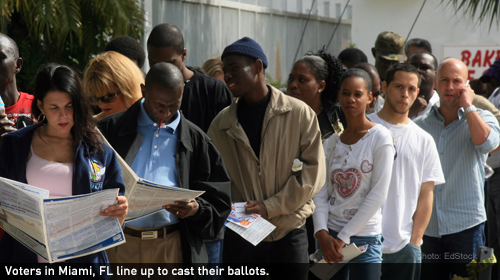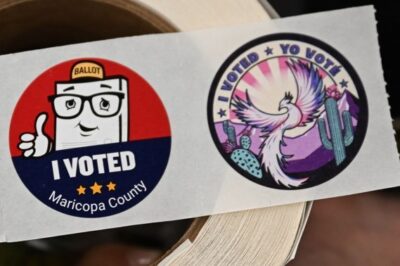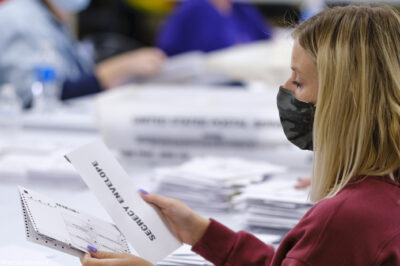
The following blog post is adapted from the remarks by ACLU of Florida Executive Director Howard Simon to the Presidential Commission on Election Administration, which held its second hearing on June 28, 2013 in Miami.
The President's charge to the Commission on Election Administration is an opportunity for a non-partisan conversation about how to promote the efficient administration of elections, provide better access to the polls for all voters, and shorten the lines at polling places.
This Commission can provide "best practices" on these matters to state lawmakers and those charged with the administration of elections.
Too often the rights of voters are lost in a tug of war between the major political parties jousting for perceived partisan advantage by manipulating election laws.
This discussion should not take place with blinders. In Florida, problems with the administration of elections were the direct and predictable consequence of policy decisions that placed extra burdens on voters and, in some counties, overwhelmed election administrators.
In Florida, the intolerable long lines that voters heroically endured in order to exercise their rights were the result of decisions made by our Legislature and Governor to shorten the number of early voting days; to end a long standing practice of same-day address change, requiring more use of provisional ballots; and perhaps the longest ballot in Florida history, which included 11 confusing and misleading constitutional amendments, one with a "Summary" of almost 600 words.
Address changes and provisional ballot issues were among the most common concerns of distressed voters. In the 2012 election, nearly 30,000 Floridians were required to cast provisional ballots. A disproportionate number were cast by African-American and Hispanic voters.
Voters went to the polling place of their old address and were allowed to vote (but with a provisional ballot which would not be counted) or they went to their old precinct and were directed to the polling place of their old address for which they were registered (and voted a provisional ballot that by law could not be counted). The problem is exacerbated by the disfranchising Florida statute that mandates that the entire ballot of a registered voter be discarded if it is cast in the wrong precinct.
The requirement that registered voters cast a provisional rather than a regular ballot if they moved from one county to another and needed to update their address on Election Day hampered the capacity of election clerks to carry out their duties processing other voters at the polls.
The 2013 Legislature addressed provisional ballots, but only for some of those who need to update their address. Those who move to a county not using an electronic register must still vote by provisional ballot.
Early voting, used by minority voters in Florida at a greater rate than non-minorities, allows voters to cast their ballot anywhere in a county, thereby avoiding the need for provisional ballots because the voter appeared at the wrong polling place.
Early voting also gives voters a cushion of time within which to resolve any issues they encounter at the polls. And if voters are required to use a provisional ballot, early voting allows voters to cure any questions about their eligibility prior to Election Day.
The Florida Legislature restored some early voting days that it took away in 2011. But the 2013 legislation still requires fewer early voting hours over fewer days than the pre-2011 election regime. The convenience with which a person can exercise their fundamental right to vote will still depend on the county in which they reside.
The ACLU of Florida urges the following best practices:
- Portability of a voter's registration so that the voter can remain registered as long as they reside in Florida.
- Use of technology to allow local election administrators direct (or indirect, by telephone) access to statewide voter rolls.
- Expansion of Early Voting to make voting more accessible and reduce the use of provisional ballots.
- More uniformity in the number of Early Voting days and hours.
In the Supreme Court's Shelby County v. Holder ruling, Justice Roberts wrote that "voting discrimination still exists; no one can doubt that." To that end, we appreciate the involvement of the Commission in recommending best practices on the front-end of election administration to avoid post-election lawsuits which – until Congress acts on the Court's invitation – can only address voting rights violations after the damage is done.
Learn more about voting rights and other civil liberties issues: Sign up for breaking news alerts, follow us on Twitter, and like us on Facebook.



